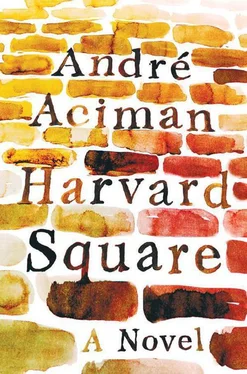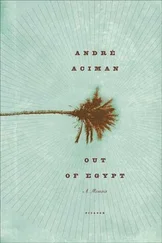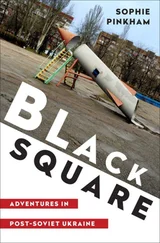“Yes, I do,” she said.
Santé!
And with this both he and I put our worries aside. He forgot all about his green card, I about my exams, my Ph.D., everything. I liked forgetting my cares. Thanks to wine, you didn’t forget them, they just stopped scaring you for a while.
IN NO TIME we reinvented France with the very little we had that evening. Bread, butter, three wedges of Brie, croque monsieur , a bowl of vichyssoise for her, a green salad to share, still more wine, dimmed café lights, laughter, French music in the background. Cambridge was just a detail.
Her name was Léonie Léonard. Kalaj couldn’t resist. But it’s a pleonasm. Yes, it was, she said shyly. Pléonie Pléonasme . Laughter, laughter. I told them that this wasn’t a pleonasm, that he was confusing a pleonasm with a tautology or, more plainly, with a redundancy. He looked at me with startled eyes and said, “Are you crazy, Professor?” We burst out laughing again.
Within minutes, we had her entire life story. He listened, posed leading questions, listened, joked, and on occasion, especially when he was laughing, reached out to touch her elbow, her wrist. He had picked up shrink talk from the women he’d met in Cambridge and understood that once a woman bares her soul there’s little else she won’t bare, the way he’d say that once a woman tells you she’s dreamed of you, you know what else she wants from you. It was just a matter of how you let her get there. He asked, she answered, he asked again, she answered, then asked, each essentially leading the other on, provided none went too fast and none folded. You were not allowed to pass. That was his rule. You had to remain in the game, at the table until everyone showed their cards. Getting bored, he once told me, was unthinkable. I interrupted their back-and-forth once or twice, and both times would have ruffled their seamless Mozart duet had either paid any attention. I had never seen someone turn la drague into a way of life. He desired women no more than anyone else, nor was he better-looking than other men. But without women he was nothing. He said so himself but never quite understood it. The important thing is that women did. He wanted women all the time. As soon as he saw a woman, a light flared in his eyes. He became excited, alert, grateful, sweet; he needed to touch, caress, kiss, bite. Women picked this up immediately. Just the way he stared at their skin, their knees, their feet screamed If I don’t touch, I am as good as dead, I don’t exist. He would stare at them straight in the eyes, brazenly, and then, eventually, let a quiver on his lips suggest a smile. He felt passion first, love much later, but interest always. Being so visibly and so boldly desired made women desire him back, which stirred his desire even further. In this as in other things, there was no ambiguity, no hesitation, no shame, no running for cover. The moral couldn’t have been simpler: if you desired someone badly enough, and desired them in the pit of your stomach, chances were they desired you no less. What you wore, who you were, what you looked like were altogether insignificant.
He was available to all women, yet he always ended up with the same type. They were between twenty-five and thirty-five, sometimes in their early forties. They had either been married or just gotten out of terrible relationships and were clearly ready to hurtle into one that promised no better. All were handicraft artists of one stripe or another, which, in his eyes, meant they came from money and were all in therapy. They were also nurses, paralegals, florists, musicians, hygienists, decorators, hairdressers, babysitters — one was even a closet organizer/consultant, another a dog walker. It did not matter what they did, what they said, who they were. He was after passion, because he had so much of it to give; after hope, because he had so little left; after sex, because it evened the playing field between him and everyone else, because sex was his shortcut, his conduit, his way of finding humanity in an otherwise cold and lusterless world, a vagrant’s last trump card to get back into the family of man. But if you asked him what he wanted most in life, he’d have said, without hesitating, “Green card.” It defined who he was at the time, how he lived, and ultimately what everything, including getting laid, was intended to procure him: la green carte . I had a green carte . Zeinab, the girl behind the counter at Café Algiers, had a green carte , so did her brother, another cabdriver. Kalaj simply looked on, like a Titan staring at the goings-on of lesser divinities from across the crags of exclusion. As for the women who’d have done anything for a man who spoke Kalashnikov when he was hot and could reach out and touch their wrist and outshrink the sharpest therapist on Harvard Square, they had probably never even seen a green carte in their lives. They were bona fide through and through. He, on the other hand, was Monsieur Pariah, an unharnessed thoroughbred with a touch of France, a few tricks from the East, and enough gumption in his fist to remind the parents of every freethinking, ill-behaved suburban daughter that she could have brought home someone far, far worse had she really meant to scare the neighbors.
After Anyochka’s, the three of us ambled back toward Café Algiers. She walked between us, leisurely and friendly. We’d stop for no reason, chat, pick up our pace, then stop again. At one point she even lingered before crossing the street as I went over some of the oddest aspects of English grammar. They laughed. I was laughing as well. I looked forward to iced coffee, the music, and the three of us talking about anything that came our way. But suddenly, Léonie said she had to leave. “Bonne soirée,” Kalaj said, as abruptly as she announced her departure. Bonne soirée was his version of a gallant, almost rakish send-off. It suggested that the evening was far from over yet and held out wonderful and unexpected prospects for you.
“She must have felt the heat,” I said, trying to show I too knew a few things about women.
“Maybe. My guess is that she is a live-in babysitter and that it’s time for her to relieve the parents. There’ll be another time.”
He ordered two cinquante-quatres for us.
“I give her at the most two to three days. She’ll show up.”
“How do you know?”
“I know.”
“Did she give you a sign ?” I said, emphasizing the word in an attempt to be humorous and show how unfounded was his assumption.
“No sign at all. I just know.” He looked at me. “With all your Harvard education, you don’t understand women, do you?”
“Oh?” I said stressing yet more irony in my voice to suggest that I did understand them, and how.
“No you don’t. You’re too flustered, so you’re either too quiet or, my bet is, you rush things. In all things, and not just women, it’s how you manage time — how you sit and wait and let things happen.” Knowing how to distend the moment and linger— savoir traîner , he called it — dragging one’s feet and letting the things you want come to you. Luck behaved no differently.
I said nothing, felt chastened. Was I so easy to read?
Did he see into the future as well?
Sabatini, as it turned out, played a few Spanish songs on his guitar. He played too slowly. But people clapped, and some cheered. A typical Sunday crowd. Fringe people. I was fringe people too. Then a young teenager, Sabatini’s pupil, borrowed his master’s guitar and played a short piece. The applause couldn’t have been more enthusiastic, and before the clapping died down, the boy immediately launched into a dreamy rendition of Chopin’s Andante spianato . It was a moving, extended tribute to his teacher, and after the applause, Kalaj immediately walked up to the boy’s father and said, “You watch, one day, one day soon…” He couldn’t come up with the right words or finish his sentence, but the father accepted graciously.
Читать дальше












